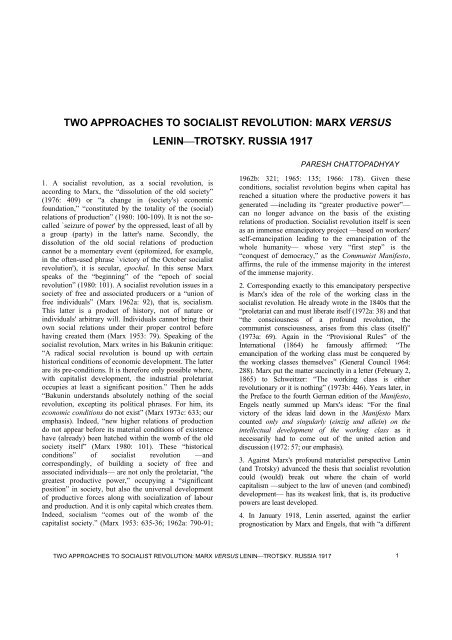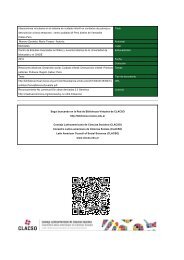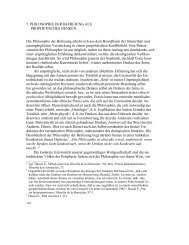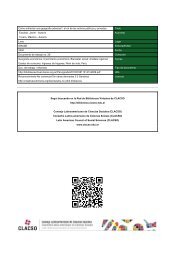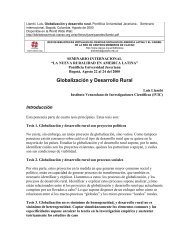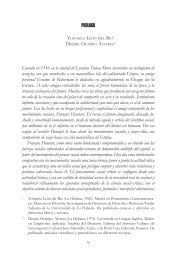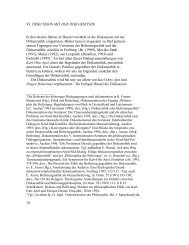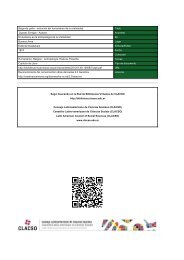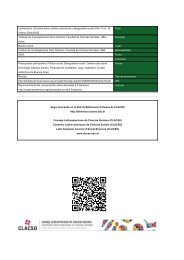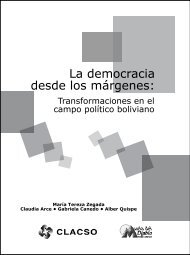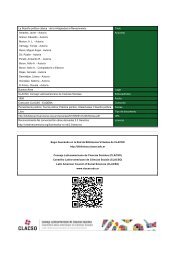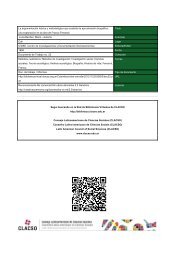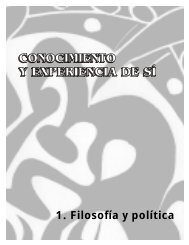TWO APPROACHES TO SOCIALIST REVOLUTION: MARX ...
TWO APPROACHES TO SOCIALIST REVOLUTION: MARX ...
TWO APPROACHES TO SOCIALIST REVOLUTION: MARX ...
Create successful ePaper yourself
Turn your PDF publications into a flip-book with our unique Google optimized e-Paper software.
<strong>TWO</strong> <strong>APPROACHES</strong> <strong>TO</strong> <strong>SOCIALIST</strong> <strong>REVOLUTION</strong>: <strong>MARX</strong> VERSUS<br />
LENIN⎯TROTSKY. RUSSIA 1917<br />
PARESH CHAT<strong>TO</strong>PADHYAY<br />
1. A socialist revolution, as a social revolution, is<br />
according to Marx, the “dissolution of the old society”<br />
(1976: 409) or “a change in (society's) economic<br />
foundation,” “constituted by the totality of the (social)<br />
relations of production” (1980: 100-109). It is not the socalled<br />
`seizure of power' by the oppressed, least of all by<br />
a group (party) in the latter's name. Secondly, the<br />
dissolution of the old social relations of production<br />
cannot be a momentary event (epitomized, for example,<br />
in the often-used phrase `victory of the October socialist<br />
revolution'), it is secular, epochal. In this sense Marx<br />
speaks of the “beginning” of the “epoch of social<br />
revolution” (1980: 101). A socialist revolution issues in a<br />
society of free and associated producers or a “union of<br />
free individuals” (Marx 1962a: 92), that is, socialism.<br />
This latter is a product of history, not of nature or<br />
individuals' arbitrary will. Individuals cannot bring their<br />
own social relations under their proper control before<br />
having created them (Marx 1953: 79). Speaking of the<br />
socialist revolution, Marx writes in his Bakunin critique:<br />
“A radical social revolution is bound up with certain<br />
historical conditions of economic development. The latter<br />
are its pre-conditions. It is therefore only possible where,<br />
with capitalist development, the industrial proletariat<br />
occupies at least a significant position.” Then he adds<br />
“Bakunin understands absolutely nothing of the social<br />
revolution, excepting its political phrases. For him, its<br />
economic conditions do not exist” (Marx 1973c: 633; our<br />
emphasis). Indeed, “new higher relations of production<br />
do not appear before its material conditions of existence<br />
have (already) been hatched within the womb of the old<br />
society itself” (Marx 1980: 101). These “historical<br />
conditions” of socialist revolution —and<br />
correspondingly, of building a society of free and<br />
associated individuals— are not only the proletariat, “the<br />
greatest productive power,” occupying a “significant<br />
position” in society, but also the universal development<br />
of productive forces along with socialization of labour<br />
and production. And it is only capital which creates them.<br />
Indeed, socialism “comes out of the womb of the<br />
capitalist society.” (Marx 1953: 635-36; 1962a: 790-91;<br />
1962b: 321; 1965: 135; 1966: 178). Given these<br />
conditions, socialist revolution begins when capital has<br />
reached a situation where the productive powers it has<br />
generated ⎯including its “greater productive power”—<br />
can no longer advance on the basis of the existing<br />
relations of production. Socialist revolution itself is seen<br />
as an immense emancipatory project —based on workers'<br />
self-emancipation leading to the emancipation of the<br />
whole humanity— whose very “first step” is the<br />
“conquest of democracy,” as the Communist Manifesto,<br />
affirms, the rule of the immense majority in the interest<br />
of the immense majority.<br />
2. Corresponding exactly to this emancipatory perspective<br />
is Marx's idea of the role of the working class in the<br />
socialist revolution. He already wrote in the 1840s that the<br />
“proletariat can and must liberate itself (1972a: 38) and that<br />
“the consciousness of a profound revolution, the<br />
communist consciousness, arises from this class (itself)”<br />
(1973a: 69). Again in the “Provisional Rules” of the<br />
International (1864) he famously affirmed: “The<br />
emancipation of the working class must be conquered by<br />
the working classes themselves” (General Council 1964:<br />
288). Marx put the matter succinctly in a letter (February 2,<br />
1865) to Schweitzer: “The working class is either<br />
revolutionary or it is nothing” (1973b: 446). Years later, in<br />
the Preface to the fourth German edition of the Manifesto,<br />
Engels neatly summed up Marx's ideas: “For the final<br />
victory of the ideas laid down in the Manifesto Marx<br />
counted only and singularly (einzig und allein) on the<br />
intellectual development of the working class as it<br />
necessarily had to come out of the united action and<br />
discussion (1972: 57; our emphasis).<br />
3. Against Marx's profound materialist perspective Lenin<br />
(and Trotsky) advanced the thesis that socialist revolution<br />
could (would) break out where the chain of world<br />
capitalism —subject to the law of uneven (and combined)<br />
development— has its weakest link, that is, its productive<br />
powers are least developed.<br />
4. In January 1918, Lenin asserted, against the earlier<br />
prognostication by Marx and Engels, that with “a different<br />
<strong>TWO</strong> <strong>APPROACHES</strong> <strong>TO</strong> <strong>SOCIALIST</strong> <strong>REVOLUTION</strong>: <strong>MARX</strong> VERSUS LENIN⎯TROTSKY. RUSSIA 1917 1
combination of the forces of socialism prevailing now” it<br />
was “easier to start the (socialist) movement” in a backward<br />
country unsullied by the vices of imperialism. “Things have<br />
worked differently than what Marx and Engels had<br />
expected.” Two months earlier he had, denounced any talk<br />
of the “impossibility of a socialist revolution in Russia “as<br />
“profoundly un-Marxist.” (In line with many other of his<br />
utterances no demonstration was needed here). Trotsky, in<br />
his turn, trying to preserve his own Marxist credentials,<br />
affirmed that the Russian revolution conformed to Marx's<br />
position. Referring to Marx's statement that no social<br />
formation disappears without having exhausted all its<br />
potential, he wrote that the imperialist war had shown that<br />
the “capitalist system had exhausted itself on a world scale”<br />
and that “the revolution in Russia was a breaking of the<br />
weakest link in the system of world wide capitalism”<br />
(1987, vol. 3: 176).<br />
5. As regards the role of capitalism's “grave diggers” in the<br />
socialist revolution, the Leninist (Trotskyist) approach is<br />
again, very different from, if not the exact opposite of that<br />
of Marx (and Engels). With the LT approach, the workers'<br />
emancipation through socialist revolution is not so much<br />
the result of the “self-activity” (Selbsbetätigung) of the<br />
workers themselves (given the appropriate material<br />
conditions) as the outcome of the seizure of (state) power<br />
by a party (called `communist') of whole time devoted<br />
revolutionaries claiming to be the leaders, the “advanced<br />
section” (peredovoi otryad), of the working class (supposed<br />
to be incapable of developing revolutionary consciousness<br />
on its own), acting in its name, and relying on the support<br />
of the mass of workers. As Lenin affirms in 1904: “We are<br />
the party of the class, therefore almost the whole class<br />
(during war, in the epoch of the civil war, the whole class)<br />
must (dolzhen) act under the leadership of our party” (the<br />
emphasized English expression is so in the text). This was<br />
Lenin's consistent stand —a couple statements to the<br />
contrary, made for the occasion, notwithstanding—<br />
throughout. Indeed, Lenin saw the party “as the repository<br />
of revolutionary theory and revolutionary consciousness<br />
leading and guiding” the workers (Carr 1964: 19). This is<br />
clearly seen in Lenin's practice during the period from<br />
April to October, 1917. During this period, while loudly<br />
proclaiming publicly “all power to the soviets” (except for<br />
a while in summer) Lenin in his private communication<br />
with the party leaders showed utter distrust if not disdain<br />
for the soviet power —this vehicle of “formal”<br />
democracy— and persevered in his attempt to persuade the<br />
leadership that the party must “alone” (v svoi ruki),<br />
ignoring the soviets, seize power. Ultimately, Lenin, by the<br />
threat of resignation from the leadership, succeeded in<br />
rallying the majority in the central committee for an<br />
immediate seizure of power, independently of and in fact<br />
behind the back of the workers' already established organs<br />
of self-rule. Always identifying working class power with<br />
the Bolshevik power, Lenin asserted, six months after<br />
October, 1912: “We, the party of the Bolsheviks . . .<br />
conquered (otvoevali) Russia from the rich for the poor . . .<br />
we must now govern Russia.” A few months later he<br />
added: “We have not till now reached the stage where the<br />
labouring masses could participate in government.” (A<br />
socialist revolution indeed!). Trotsky, who in his youth<br />
(1904) had, in the name of the “self activity of the<br />
proletariat,” denounced Lenin's “political substitutionism”<br />
of the party for the proletariat, completely reversed his<br />
position after his conversion to Leninism circa 1917. I<br />
Deutscher, referring to Trotsky's 1904 Lenin-critique,<br />
wrote: “Trotsky could have no inkling that one day he<br />
himself would go much farther than Lenin in preaching and<br />
glorifying that substitutionism” (1963: 96). This is seen in<br />
Trotsky's position in the early 1920s. For example, in 1920<br />
he wrote that “revolutionary domination of the proletariat<br />
presupposes the same domination of the party in the<br />
proletariat” and that “in the substitution of the power of the<br />
party for the power of the working class there is in fact no<br />
substitution.” Writing in 1930 in his famous History he<br />
affirmed: “The Bolsheviks saw it their mission to stand at<br />
the head of the people . . . the Bolsheviks were the people.”<br />
6. Lenin's `weakest link” argument became a canon of the<br />
dominant Left as well as of those sympathetic to the<br />
Bolshevik régime. Just to give a few outstanding examples,<br />
Antonio Gramsci observed, shortly after the Bolshevik<br />
victory, that as opposed to Capital's “demonstration of the<br />
fatal necessity of the formation of a bourgeoisie and the<br />
inauguration of a capitalist era” before the proletariat could<br />
have its own revolution, “facts have left behind the<br />
ideologies, the canons of historical materialism” (1973:<br />
130). I. Deutscher wrote: “It was the Russian Marxists, and<br />
not Marx and Engels whom (the events in Russia) proved<br />
to be right” (1980: 184). Later E.H. Carr wrote: “Marxist<br />
scheme of revolution was bound to break down when the<br />
proletarian revolution occurred in the most backward<br />
capitalist country,” which thus showed “an error of<br />
prognostication in the original Marxist scheme” (1964: 43-<br />
44). Much later P.M. Sweezy expressed the same idea:<br />
“The revolutions that put socialism on history's agenda took<br />
place not in economically developed countries, as Marx and<br />
Engels thought they would, but in countries where<br />
capitalism was still in early stages” (1993: 6).<br />
<strong>TWO</strong> <strong>APPROACHES</strong> <strong>TO</strong> <strong>SOCIALIST</strong> <strong>REVOLUTION</strong>: <strong>MARX</strong> VERSUS LENIN⎯TROTSKY. RUSSIA 1917 2
7. However, these individuals, under the spell of the<br />
spectacular political event of the time and carried away by<br />
the ideological discourses of its principal actors and<br />
ignoring the real “contradictions of material life” (Marx<br />
1859) and thereby “sharing the illusion of the epoch” —in<br />
Marx's penetrating phrase (1973a: 39; emphasis in<br />
original)— dismissed Marx's materialism too rapidly. As<br />
Lenin quickly realized, given Russia's backwardness, there<br />
was no other way to go forward, but to “catch up and<br />
surpass” the advanced capitalist countries —which implied<br />
a rapid growth of the productive forces and an advanced<br />
working class, and this necessitated precisely the<br />
development of capitalism in a largely pre-capitalist<br />
country where the inauguration of socialism was an<br />
impossible project. 1 In more than one text of the period<br />
Lenin affirmed the desirability of the development of<br />
capitalism in Russia at least “to some extent and for some<br />
time,” of course, under the `proletarian' state. The reality of<br />
the period 1917-1928 vindicated Lenin's position. A<br />
government decree of September 10, 1921, described the<br />
wages system as a “fundamental factor of industrial<br />
development, wages and employment being considered as a<br />
matter of relation based on freely consented contract<br />
between the workers and the concerned enterprise.” “In less<br />
than a year NEP had reproduced the characteristic<br />
essentials of a capitalist economy” (Carr 1963: 320, 321,<br />
323). The data also support this. Thus while the share of<br />
independent commodity producers —in handicrafts and<br />
1 The `Preface' to the Russian edition (1882) of the Manifesto did<br />
posit the possibility of Russia — with still more than half of its<br />
land under communal ownership - to go over to communism<br />
skipping the capitalist stage, provided a “revolution” took place in<br />
the country complemented by a “proletarian revolution” in the<br />
West. Now, the “revolution” in Russia hoped for by Marx and<br />
Engels was clearly not a proletarian revolution, but a revolution by<br />
the Russian people (basically the peasantry) against the Tsarist<br />
state, principally to prevent the process of “decomposition”<br />
already appearing in the communal system (as noted by Marx in<br />
his correspondence with Kovalevsky and Zassulitch in 1877 and<br />
1881). However, the Russia of 1917 was not exactly the Russia of<br />
1882. By the First, World War capitalism, though in its initial<br />
stage and far from dominating the country, had made nonnegligible<br />
inroads in society. In fact in his correspondence with the<br />
Russians (written in French) Marx affirmed (1877, 1881) with<br />
astonishing clairvoyance that, given the gradual decomposition of<br />
Russia's rural communes — following the tsarist legislation of<br />
1861 (on the `emancipation' of serfs) — Russia would be<br />
compelled to traverse “all the vicissitudes of the capitalist regime”<br />
before its social transformation.<br />
agriculture— in the total population (including non<br />
working dependents) remained constant at 75 per cent level<br />
between 1924 and 1928, the share of `workers and<br />
employees' —that is, wage and salary earners— rose from<br />
15 percent to 18 percent between the two dates (Narkhoz<br />
1987: 11). As a particular indicator of the early phase of<br />
capitalist development we could note that in metallurgy and<br />
coal mining the share of workers originating from the<br />
peasant families increased from an average of 43.4 percent<br />
for 1918-1925 to 53.5 percent in 1926-1927. Taking the<br />
industrial production as a whole, its index rose from 39.5 in<br />
1922-23 to 119.6 in 1927-28 (1913: 100) The number of<br />
industrial workers doubled, increasing from 1.4 million to<br />
2.8 million during the same period (Prokopovich 1952:<br />
279, 283). The total value of output of large scale industry,<br />
at 1926-27 prices, grew from 1.9 milliard in 1921 to 15.7<br />
milliard in 1928 (Baykov 1970; 121; Narkoz 1922-82:<br />
152). The development of the industrial economy was of<br />
course based on wage labour. Quite appropriately<br />
accompanying the whole process was the methodical<br />
liquidation of the factory committees as centers of workers'<br />
self-administration as well as the “transformation of the<br />
soviets from the organs of proletarian self-rule and vehicles<br />
of radical democracy into organs allowing the party elite to<br />
read the masses” (Anweiler 1998: 303). In April, 1918,<br />
Lenin discovered that the “Russian is a bad worker in<br />
comparison with the workers of the advanced nations.”<br />
Therefore, instead of collectively administering the affairs<br />
of the work place, through their own elected organs —a<br />
practice which earlier the Bolsheviks were the foremost to<br />
champion but now denounced as “petty bourgeois<br />
spontaneity”— the masses must, show the “unquestioning<br />
obedience to the single will of the leaders of the labour<br />
process” and must accept “unquestioning subordination<br />
during working time to the one-person decision of the<br />
soviet directors, of the soviet dictators, elected or<br />
nominated by soviet institutions (and) provided with<br />
dictatorial powers (diktatorskimi polnomochiyani).” Two<br />
years later, at the 9th party congress, Lenin denounced the<br />
still “surviving notorious democratism” and characterized<br />
the “outcry against appointees” as pernicious trash (vrednyi<br />
khlam).”<br />
8. The beginning `moment' of the Russian Revolution in<br />
February 1917, initiated and dominated entirely by Russia's<br />
toilers without any party guidance, had all the basic features<br />
of the great popular revolutions of the past such as those of<br />
1789-93 and 1871 in France. Targeting mainly the precapitalist<br />
social order, this revolution started out as an<br />
immense democratic mass movement in an open-ended,<br />
<strong>TWO</strong> <strong>APPROACHES</strong> <strong>TO</strong> <strong>SOCIALIST</strong> <strong>REVOLUTION</strong>: <strong>MARX</strong> VERSUS LENIN⎯TROTSKY. RUSSIA 1917 3
plural revolutionary process which the different political<br />
parties increasingly tried to bring under control advancing<br />
their own agenda as the agenda of the toilers. As Trotsky<br />
writes in his monumental history: “The February revolution<br />
was begun from below, overcoming the resistance of its<br />
own revolutionary organizations, the initiative being taken<br />
on their own accord by the most oppressed and<br />
downtrodden part of the proletariat, . . . nobody summoned<br />
the masses from above to insurrection” (1987, vol. 1: 102).<br />
9. Contentwise a bourgeois democratic revolution in<br />
process, the February upsurge, given its spontaneous mass<br />
character marked by open-ended plurality, had, it appears,<br />
the potential to go over, at a later date —given appropriate<br />
material conditions— to an authentic socialist revolution<br />
(in Marx's sense) if the involved toiling masses had been<br />
allowed unfettered freedom —through their (own) selfadministering<br />
organs— to continue their march forward.<br />
The Bolshevik seizure of power, putting a brake on the<br />
process, destroyed the democratic part of the revolution —<br />
derogatively called “notorious democratism” (Lenin)— and<br />
accelerated the bourgeois part, the pace of which would of<br />
course be dwarfed under Lenin's successor with an<br />
unprecedented accumulation drive under the slogan —<br />
textually taken over from Lenin (September 1917)— of<br />
“catching up and surpassing” (dognat'i peregnat') the<br />
advanced capitalist countries (Resheniya I 1967: 539).<br />
10. Following the capitalist path by the new regime 2 —the<br />
proclamation of having inaugurated a `socialist revolution'<br />
notwithstanding— only demonstrated that a “society's<br />
natural development phases can neither be jumped over nor<br />
legislated away” (Marx 1962a: 16). In fact the so<br />
(mis)called `socialist revolutions in the twentieth century<br />
have only confirmed Marx's profound materialist position:<br />
“Individuals build a new world from the historical<br />
conquests of their foundering world. They must first, in<br />
course of their development, produce the material<br />
conditions of a new society, and no effort of mind or will<br />
can free them from this destiny” (1972b: 339). Indeed,<br />
history, this “greatest of all Marxists,” as Hilfeding used to<br />
say, has shown that “if in the society as it is we do not find<br />
2 Outside of Russia, within the Leninist tendency, A. Bordiga<br />
seems to have been about the only one — at least among the front<br />
rankers — who understood this. In the period immediately<br />
following the Bolshevik victory, Bordiga wrote: “The stateization<br />
of factories, enterprises, banks and agricultural farms are already<br />
revolutionary measures, but of the capitalist revolution” (1980:<br />
144; emphasis in text)<br />
in a latent (verhüllt) form the material conditions of<br />
production and corresponding relations of circulation for a<br />
classless society, all attempts at exploding it would be don<br />
Quixotism” (Marx 1953: 77). And Marx had the last laugh.<br />
REFERENCES<br />
Anweiler, Oskar. 1958, Die Rätebewegung in Russland<br />
1905-1921, Leiden: E.J. Brill.<br />
Baykov, Alexander. 1970. The Development of the Soviet<br />
Economic System. London: Cambridge University Press.<br />
Bordiga, Amadeo. 1980. Proprietà e Capitale, Florence:<br />
Iskra<br />
Carr, E.H. 1963. The Bolshevik Revolution, volume 2,<br />
London: Macmillan.<br />
______1964. The Bolshevik Revolution, volume 1, London:<br />
Macmillan.<br />
Deutscher, Isaac. 1960. Russia in Transition. New York:<br />
Grove Press<br />
______1963. The Prophet Armed: Trotsky 1919-1921.<br />
London: Oxford University Press.<br />
Engels, Friedrich. 1972. “Vorwort zur 4, deutschen<br />
Ausgabe des `Manifest der Kommunistischen Partei'“ in<br />
MEW, vol. 22, Berlin: Dietz.<br />
General Council of the First International 1864-1868. 1964.<br />
Minutes. Moscow: Foreign Languages Publishing House.<br />
Gramsci, Antonio. 1973. Scritti politici, vol. 1. Rome:<br />
Editori Riuniti.<br />
Marx Karl. 1953. Grundrisse der Kritik der politischen<br />
Ökonomie. Berlin: Dietz, Verlag.<br />
______1962a. Das Kapital, volume 1. Berlin: Dietz.<br />
______1962b. Theorien über den Mehrwert, volume 3.<br />
Berlin, Dietz.<br />
______1965. “Misère de la Philosophie,” “Le Capital,”<br />
livre premier, in Karl Marx, Oeuvres: Économie, volume 1,<br />
Paris: Gallimard.<br />
______1966. “Manifest der kommunistischen Partei” and<br />
“Randglossen zum Programm der deutschen<br />
Arbeiterpartei” in Karl Marx, Frederich Engels,<br />
Studienausgabe, volume 3, Frankfurt am Main, Fischer<br />
Taschenbuch.<br />
<strong>TWO</strong> <strong>APPROACHES</strong> <strong>TO</strong> <strong>SOCIALIST</strong> <strong>REVOLUTION</strong>: <strong>MARX</strong> VERSUS LENIN⎯TROTSKY. RUSSIA 1917 4
______1972a. Die heilige Familie in MEW, vol. 2. Berlin:<br />
Dietz.<br />
______1972b. “Die moralisierende Kritik . . .” in MEW,<br />
vol. 4. Berlin: Dietz.<br />
______1973a. Die deutsche Ideologie in MEW, vol. 3.<br />
Berlin: Dietz.<br />
______1973b. “Brief an Schweitzer” (13.2.1865) in MEW,<br />
vol. 16. Berlin Dietz.<br />
______1973c. “Konspekt von Bakunins Buch `Staatlichkeit<br />
und Anarchie'“ in MEW, volume Berlin: Dietz.<br />
______1980. “Ökonomische Manuskripte und Schriften<br />
(1858-1861” in MEGA, Section 2, volume 2. Berlin: Dietz.<br />
Narkhoz 1922-1982. 1982. Narodnoe khoziaistvo SSSR<br />
1922-1982: Jubileinyi Statisticheskii ezhegodnik, Moscow.<br />
Narkhoz 1987. 1987. Narodnoe khoziaistvo SSSR za 70 let.<br />
Moscow.<br />
Prokopovich. 1952. Histoire économique de l'URSS. Paris:<br />
Flammarion.<br />
Resheniya partii i pravitel'stva po Khoziaistvennym<br />
Voprosam, Volume 1, 1967. Moscow: Politizdat.<br />
Sweezy, P.M. 1993. “Socialism: Legacy and Renewal,” in<br />
Monthly Review, January.<br />
Trotsky, Leon. 1987. The History of the Russian<br />
Revolution, volumes 1, 2, 3. New York: Pathfinder Book.<br />
<strong>TWO</strong> <strong>APPROACHES</strong> <strong>TO</strong> <strong>SOCIALIST</strong> <strong>REVOLUTION</strong>: <strong>MARX</strong> VERSUS LENIN⎯TROTSKY. RUSSIA 1917 5


